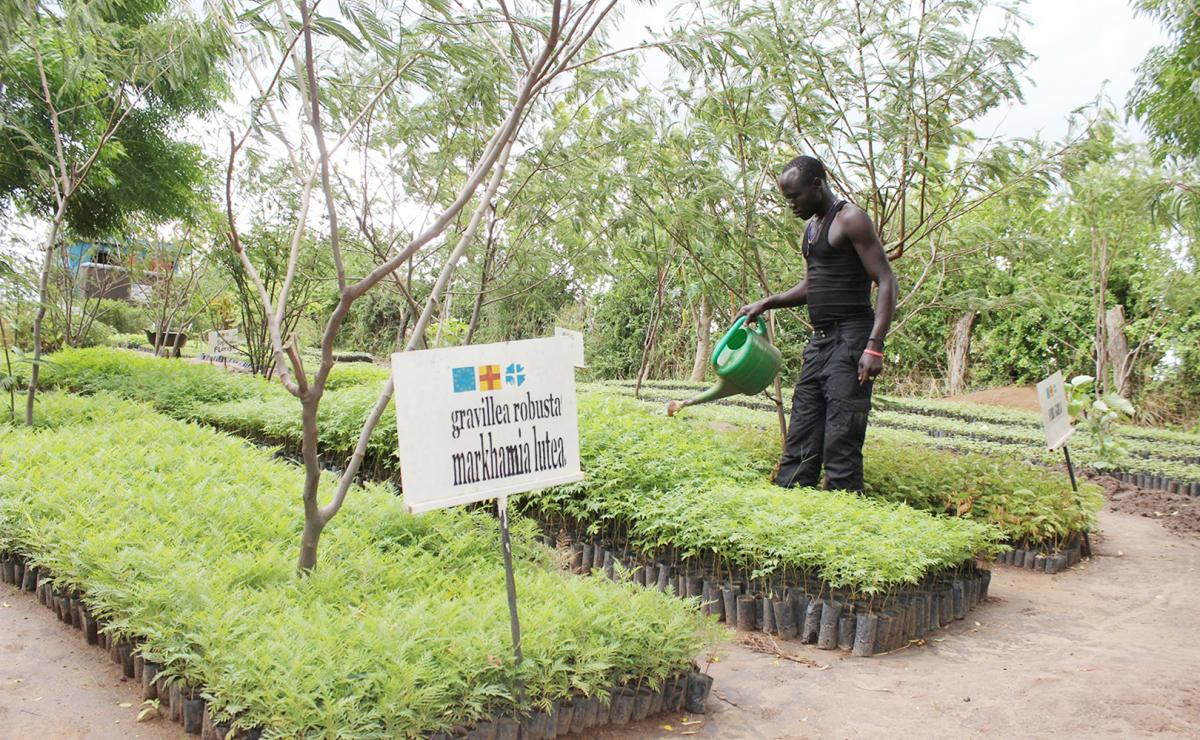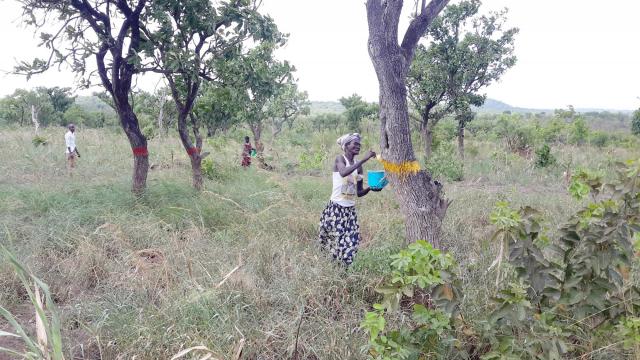LWF’s environmental conservation interventions in refugee settlements

Cut a tree today, pollute the air with dangerous fumes and feel the wrath of global warming tomorrow. Plant one tree today and enjoy fresh clean air tomorrow.
Climate change has been manifested in Uganda through unpredictable, intense, and at times extreme weather events such as storms, droughts, floods and landslides. This risks livelihoods and food security of communities in Uganda, especially the rural populace. The magnitude, frequency and severity of these hazards, especially drought, have increased over the past decades yet the Ugandan economy and the wellbeing of the population are intricately linked to the natural environment and therefore highly vulnerable to climate change.
Climate change is attributed to anthropogenic activities such as poor farming practices, excessive demand for bio-energy resources, industrialisation, among others. To combat this havoc and prevent global warming, it’s our duty as humans to protect the environment.
LWF is playing its role in protecting the environment while settling refugees. Trees are marked, seedlings are provided to refugees for planting, the use of solar energy and energy-efficient stoves is promoted within Uganda’s refugee settlements and host communities.
LWF also advocates for bylaws against careless tree cutting in the different districts, like Lamwo, Kitgum, Adjumani and Moyo where it implements some of its projects.
Guided by the National Environment Act, 1995 and the National Forestry and Tree Planting Act, 2003, LWF promotes tree planting by offering refugees tree seedlings to conserve the environment through reforestation. Refugees receive poles to use in constructing shelter. By giving them seedlings for planting, LWF is replanting the trees cut to get the poles. LWF believes that tree planting is a must for environmental protection as they (trees);
- Impound carbon from anthropogenic activities and prevent the accumulation of greenhouse gases in the atmosphere.
- Supply oxygen to all living creatures hence sustaining life on earth.
- Play a major role in the hydrological cycle through evapo-transpiration hence ensuring continuous water supply on earth.
- Stabilise the soil and prevent erosion.
- Break the intensity of wind hence protecting both the built and natural environment from destruction.
- Clean the air by absorbing pollutant gasses, like nitrogen oxides, ammonia, sulphur dioxide, carbon dioxide and release oxygen to the environment.
- They create habitats for wildlife, which is one of the economic sources of our country- Uganda.
- Protect watersheds from erosion and eutrophication through stabilising the upstream areas.
- They provide shade which offers a cooling effect, in addition to emitting vapour which is responsible for forming rainfall.

Before refugees are settled, LWF’s environment team in liaison with the district natural resource department paint mark all the trees that should not be cut and those that can only be cut with permission from the District Forestry Offices.
Trees highlighted in the International Union for Conservation of Nature red list of endangered species are paint marked red and these include; the shear nut tree, indigenous trees of cultural importance, as well as trees in the buffer zones. Trees marked with yellow are those that can only be cut after approval from the District Forestry Officer. Such trees include those with girth greater than 300 millimetres and fruit trees.
Marking of trees is followed by environmental sensitization to refugees on their arrival at the reception centre. This is done to educate and inform them of the importance of the environment, human impacts on the environment, mitigation measures to prevent or reduce environmental degradation, and interpretation of the paint marks on the trees.
In the settlements, reception centres and collection points, LWF uses environmentally friendly energy-solar for lighting. Solar power is renewable and clean (doesn’t emit toxic gases) and is freely available from the sun. It also reduces the pressure on bio-energy resources as some community members use firewood and grass for lighting.
LWF promotes the use of energy-efficient stoves at the reception centres and collection points as soon as it (LWF) commences its activities there. This is done to prevent the use of highly inefficient and risky three-stone cooking stoves, which require large amounts of wood, hence increased pressure on bio-energy resources and emission of harmful and greenhouse gases to the atmosphere.
LWF’s environmental conservation initiatives are also in line with the National Environment Act, 1995 and the Investment Code Act 13 section 19(1)(d) because it (LWF) ensures that its suppliers of seedlings, construction poles (treated and untreated) do not in any way degrade Uganda’s ecology or environment, while executing their duties. Suppliers of seedlings and poles are required to be approved by the National Forestry Authority, under the National Forestry and Tree Planting Act, 2003. They are also required to replant trees and also use environmentally friendly chemicals to ensure that the operation of their businesses does not cause any harm to the environment.

